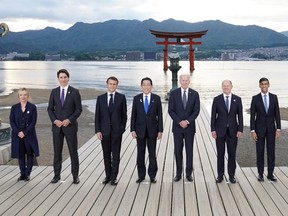加拿大目前的发展似乎差强人意,连美国主流媒体都不怎看好。华尔街日报:加拿大正游离七国集团外
最近,美国著名报刊《华尔街日报》在一篇社论中表示,加拿大在领导能力、经济、国防占比等方面的表现,让人怀疑其已经游离在七国集团之外。
philiph Cross: the wall street journal asks a good question - does Canada belong in the G7
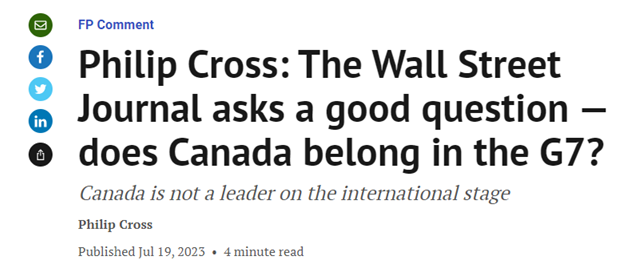
社论认为,加拿大在国际舞台上不是一个领导者。正如全球事务专家伊恩•布雷默在其著作《Every Nation for Itself》中所言,领导者拥有协调跨国问题的杠杆,拥有财富和权力,可以说服其他国家采取他们本不会追求的行动。它支付其他国家负担不起的账单,并提供其他人不愿支付的服务。在一个又一个问题上,它制定国际议程。然而,加拿大做出这些事情似乎遥不可及。
缺乏领导力的部分原因在于,这十年多来加拿大经济增长疲软,让其逐步远离世界经济重要参与者的角色。只有当经济复苏为重建我们的军事实力和经济实力提供所需的资金,并且拥有经济重量使其他国家渴望进入我们的市场时,加拿大才能在世界舞台上恢复其地位。
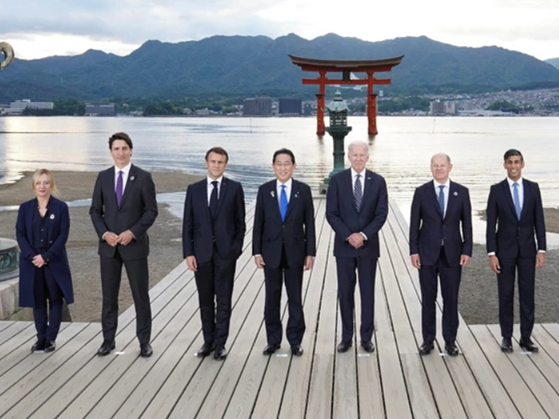
社论还提到,在七国集团中,加拿大的国防支出垫底。这让人质疑加拿大是否仍愿意承担七国集团成员的责任。
然而,加拿大受到的限制不仅仅是由于其相对较小的人口和经济,还受到一种“加拿大人不思大事”的心态所束缚,正如艺术历史学家芭芭拉•道奇所说。如今,加拿大追求的是友善和进步,而不是伟大或强大。
社论引用了加拿大总理特鲁多在2021年向国防部长发出的任务书,其中将“建立一个包容和多元的国防团队,努力打造一个健康的工作环境,摆脱骚扰、歧视、性行为不端和暴力”确定为首要任务。

社论暗示,不解决上述问题,加拿大应该坐在“小孩子”那一桌,而不是“成年人”那一桌。
《华尔街日报》得出结论,如果加拿大不想扮演那个角色,那么七国集团应该考虑寻找替代者。
TD Economics:加拿大生活水平下滑 人均GDP增长滞后
抛开领导力、国防等方面不说,上述社论所提及的加拿大经济现状,不无道理。
道明经济研究公司(TD Economics)的一份新报告称,加拿大看似经济从疫情中强劲复苏的事实,实际上掩盖了发达经济体生活水平表现不佳的情况。
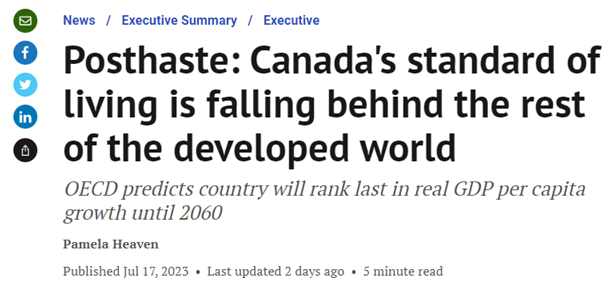
道明银行经济学家 Marc Ercolao 表示,“经济增长并不一定等于经济繁荣。”
从表面上看,加拿大的经济增长看起来很健康。“强劲”的移民和人口增长帮助推动了疫情后经济活动的快速复苏,特别是消费和房地产市场。
根据加拿大统计局的数据,2022年加拿大增加了105万人,其中约96%的增长是由于国际移民。这是加拿大历史上首次单年人口增长超过 100 万人。
这一增长使得加拿大保持了G7国家中人口增长最快国家的地位,目前加拿大的人口增长率为2.7%,这样的速度将使加拿大人口在大约26年内翻一番。
到2023年6月16日,加拿大总人口已突破4000万人。
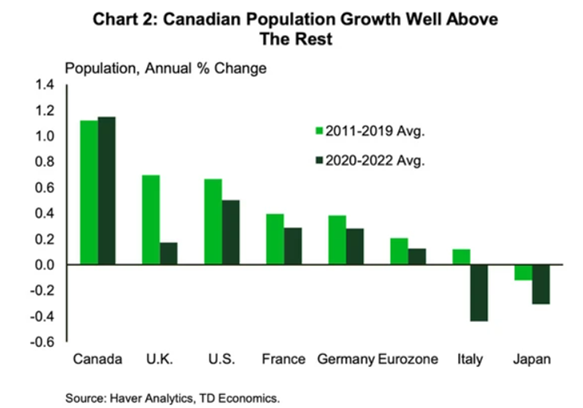
然而,Ercolao 说,“虽然 GDP 总量是一回事,但生活水平是另一回事,当加拿大的经济表现根据不断增长的人口数量进行调整时,它所揭示的情况还有很多不足之处。”
在世界舞台上,以实际人均国内生产总值衡量,加拿大是少数几个尚未恢复疫情前生活水平的发达经济体之一。
实际人均国内生产总值这一指标在过去三个季度出现萎缩,道明银行预测,该指标将持续萎缩,直至 2024 年底。
更令人担忧的是,经济合作与发展组织(OECD)预测,在 2060 年之前,加拿大的实际人均国内生产总值增长将在经合组织成员国中垫底。
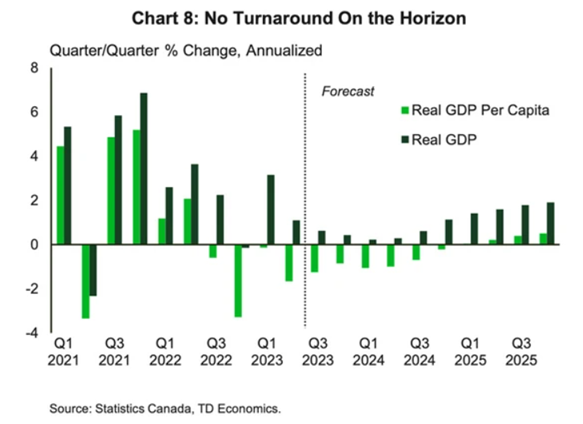
Ercolao 表示,20 世纪 80 年代初,加拿大的人均 GDP 比发达经济体的平均水平高出近 4,000 美元,但到 2000 年,这一优势几乎消失。那一年美国的人均GDP超过加拿大 8,000 美元以上。
自 2014-2015 年石油危机以来,“加拿大的表现每况愈下”,每年仅上涨0.4%,而发达经济体的平均增长率为 1.4%。
Ercolao 表示,问题的核心是生产率下降,这是加拿大多年来一直在努力解决的问题,他指出了造成这一问题的几个因素。
其中包括过去八年对建筑、机械和知识产权的商业投资“乏善可陈”,以及研发支出的长期下降导致了“创新差距”。

Ercolao 说,“过去20年来,加拿大的研发投资一直在下降,而其他七国集团国家的研发投资却有不同程度的增长。”
2021 年,加拿大的研发支出约占 GDP 的 1.7%,是美国份额的一半,并且低于大多数其他国家。
加拿大经济还包含相对较多的小公司,这些公司的出口和投资往往少于大公司。他说,低效的监管和税收政策是阻碍生产力和创新的其他因素。
有些省份的情况会好一些。由于能源部门的支出,石油资源丰富的阿尔伯塔省、萨斯喀彻温省和纽芬兰及拉布拉多省的人均 GDP 水平最高。

但自上个十年的石油危机以及该行业从大型项目和投资转向以来,它们的地位也一直在下滑。
Ercolao 说,“不幸的是,对于加拿大人来说,加拿大人的生活水平几乎没有好转的迹象。”
这个问题之所以没有引起注意,是因为生产力问题被新工人涌入带来的增长所掩盖,但 Ercolao 表示, “越来越难以忽视加拿大与其它主要经济体之间不断扩大的实际人均 GDP 差距。”
不过,从2022年的统计数据来看,在世界主要经济体系的人均GDP中,除了美国、澳洲和部分北欧发达国家所占据的第一档(高于6万美元)之外,加拿大仍处于第二档(5万至6万美元区间),在七国集团中仅次于美国。

高房价压垮加拿大民众
工资增长水平,远不及飙升的物价,特别是房价(租金),着实让加拿大普通民众的生活水平下降不少。
根据加拿大房地产协会的数据,截至 2023年6月,全国房屋平均价格达到 709,218元。更离谱的是温哥华,房屋均价已达1,203,000元。在温哥华,要置业,所需的最低年收入已达235,650元。
房价的高涨,亦带动了租金疯狂上升。

渥太华智库加拿大政策替代中心(CCPA)分析涵盖了全国37个主要城市的776 个社区,计算出人们每周工作 40 小时必须赚多少钱才能支付不超过其收入30% 的住房费用,而住房费用是他们收入的 30%,称为“租金工资”。
根据加拿大抵押贷款和住房公司的说法,支付的费用超过这个数字就会导致住房 “负担不起” 。
数据显示,除了魁北克省的三个城市以外,其他34个城市均负担不起住房,温哥华、多伦多最为离谱。
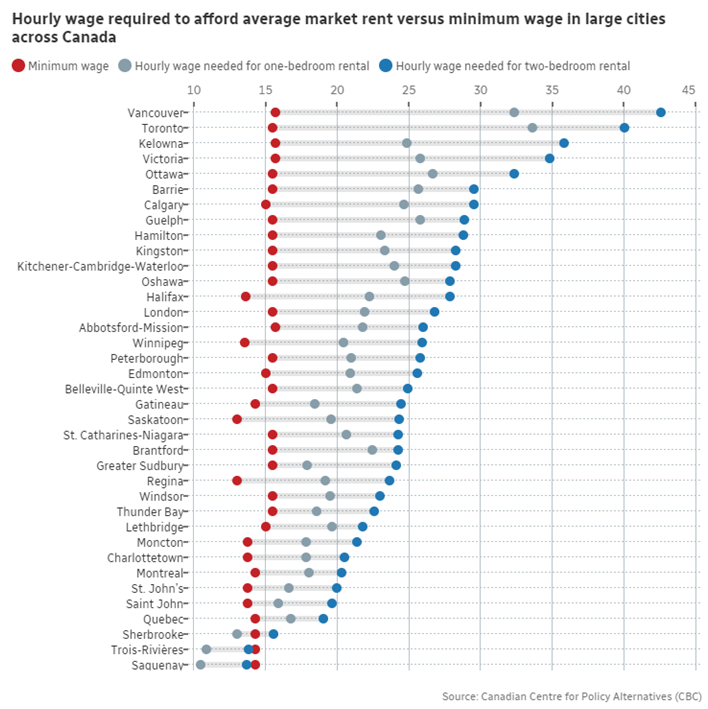
如果一个人想住在温哥华普通的一居室公寓,按租金不超收入的 30%的标准,则需要每小时赚取32 加元;要住得起两居室,一个人每小时必须挣 43 加元。
这两种情况,都是最低工资的两倍以上。这意味着,即使是一居室公寓,也必须有两个人拿着最低工资才能住得起一居室公寓。
同样,多伦多住一居室公寓,需每小时赚取33加元;住两居室,则需每小时赚取40加元。
或许,这只是危言耸听,但正如文中所提及,当经济出现问题、民众生活水平下滑时,政府不应选择忽视,应该动动脑筋,作出对策了。
Philip Cross: The Wall Street Journal asks a good question — does Canada belong in the G7?
https://www.countyweeklynews.ca/opinion/does-canada-belong-g7
Canada is not a leader on the international stage
Article content
A recent Wall Street Journal editorial suggested Canada should sit at the kiddies table in the NATO alliance instead of with the adults. This is because as a share of GDP our defence spending is seventh lowest among NATO’s 31 member nations. It’s also lowest among the G7, which prompted the Journal to question whether we are still willing to accept our responsibilities as a member of the G7. It concluded that if this country “doesn’t want to play that role, then the G-7 should consider a replacement.”
Wall Street Journal editorials have an impact. In January 1995 the paper’s editorialists drew global attention to our looming debt crisis by calling us “an honorary member of the Third World.” Their suggestion today that Canada could lose its G7 membership should therefore be taken seriously, especially since our inclusion in the group in 1976 owed less to our merits and more to U.S. concerns about left-wing European nations (France, Germany, Italy and pre-Thatcher Britain) having too much weight.
Great nations, institutions and people achieve greatness by aspiring to it. Max Mason, president of the University of Chicago, said in 1929 the institution “must be outstanding or nothing. There is no reason for its existence as just another university.” Chicago met that challenge, since garnering the most Nobel Prizes in economics of any institution. For a nation to be great, however, aspiration must extend beyond its leaders. President Kennedy, when touring NASA headquarters early in the 1960s, asked a cleaner why he was there. The worker replied, “Mr. President, I’m here to put a man on the moon.”
Canada is not a leader on the international stage. In his 2012 book Every Nation for Itself, global affairs expert Ian Bremmer wrote that: “Leaders have the leverage to co-ordinate multinational responses to transnational problems. They have the wealth and power to persuade governments to take actions they wouldn’t otherwise pursue. They pick up the checks that others can’t afford and provide services no one else will pay for. On issue after issue, they set the international agenda.” Name the last time Canada did any of those things.
Partly because of a decade of weak economic growth, Canada is no longer a serious player in the world economy. And we are unlike the rest of the G7, none of which is little brother to a big brother next door. Our relationship with the U.S. is more like Austria’s or Holland’s with Germany. Unless we prove we deserve a seat at the adults’ table, we should be talking with other middle powers about how to live next door to an elephant. Canada will not regain its stature on the world stage until renewed economic growth provides the money needed to rebuild our military capacity and the economic heft that makes others covet access to our markets.
Canada is limited by more than our relatively small population and economy, however. We are also constrained by the mindset that “people in Canada don’t think big,” as art historian Barbara Dodge put it. Canada today strives to be nice and progressive rather than great or strong. The Wall Street Journal editorial quoted from Justin Trudeau’s mandate letter to the minister of defence in 2021, establishing it as a priority that she “build an inclusive and diverse Defence Team, characterized by a healthy workplace free from harassment, discrimination, sexual misconduct and violence.” As the Journal editorialists sarcastically remarked, “See how that cultural manifestation works on the Ukrainian front lines.”
Michael Wilson’s posthumous 2022 memoir, Something Within Me, bluntly warned Canadians that “Yes, we are nice people, but let’s not try to be too nice … The emphasis on niceness represents a danger … of the Justin Trudeau’s government approach to international relations. We’re not here to build a nice country. We’re here to build a strong country — strong in our values, our economy, our technical achievements, and our influence in the world. You can’t build a strong country by just working to be nice to people. We have to step out in front and play a leadership role in matters where mid-sized countries can exert influence.”
Article content
In 1904 Wilfrid Laurier said “the twentieth century shall be the century of Canada and Canadian development … For the next hundred years, Canada shall be the star towards which all men who love progress and freedom shall come.” Laurier’s ambition for his country was laudable but his prophecy was spectacularly wrong: the 20th century clearly belonged to the United States, not Canada. Being potentially great is not enough. At some point potential must be realized, or Thomas Philippon’s observation about Brazil will also describe us: “the country of the future — and always will be.”
Philip Cross is a senior fellow at the Macdonald-Laurier Institute.















